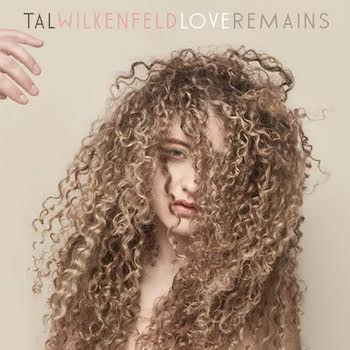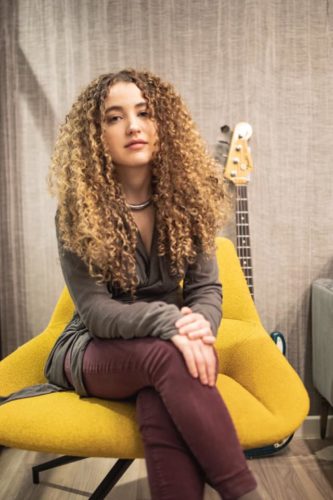Music Interview: From Bass Goddess to Singer/Songwriter — Tal Wilkenfeld
By Jason M. Rubin
With the release of her second solo album, Tal Wilkenfeld has become more than a bass virtuoso: she’s a sensitive songwriter, expressive singer, and capable guitarist.

It used to be easy to label Tal (pronounced “tall”) Wilkenfeld. She was the spunky young female bass virtuoso who routinely stole the spotlight from guitar legend Jeff Beck in countless YouTube clips of her performances in his band over a period of years in the 2000s. Today, with the recent release of her second solo album, Love Remains, she is so much more: a sensitive songwriter, expressive singer, and capable guitarist. She will put all her talents on display at her upcoming show at City Winery Boston on June 4.
Even while she was with Beck, Australian-born Wilkenfeld (still young at 32) also performed with other heavy hitters, such as Chick Corea, Herbie Hancock, Prince, Lee Ritenour, and Eric Clapton. Her ability to more than hold her own on her instrument with such masters made her a favorite among prog/jazz music snobs (mostly male), an audience she rewarded with her first solo album, 2007’s funk-fusion Transformation, an entirely instrumental album recorded in two days. Showing off her prodigious technical skill on bass, Transformation was the kind of record more popular with musicians and critics than with mainstream consumers.
According to Wilkenfeld, the songs on Love Remains (no instrumentals and only one bass solo) were written over the last several years. She previewed many of them the last time she was in Boston (March 18, 2016, Brighton Music Hall) in an impressive set that also included two surprising covers: “Last Goodbye” by Jeff Buckley, and “How Soon Is Now” by The Smiths.
Now recorded in pristine sound quality and accompanied by a lyric booklet, these songs make it clear that Wilkenfeld is bridging the male-oriented audience who fell in love with her powerful chops and wild mane, and the #MeToo movement of women who are reclaiming their voices and owning their stories. Tal Wilkenfeld has something to say and she has mined her own feelings and experiences to craft songs whose melodies and lyrics linger. While her heart may have been broken, her spirit hasn’t, as in “Fistful of Glass” (I have done this dance before/I know what it’s like to hit the floor/And still get up wanting more) and “Killing Me” (I wanna be held but not beholden/Standing my ground with one eye open).
In advance of her show at City Winery, and in possession of (and, frankly, obsessed with) Love Remains, I spoke with Tal about her transformation from bass goddess to singer/songwriter (it’s worth noting that Jackson Browne is credited as executive producer).
Arts Fuse: How hard was it to go from sideman to leader, from being the bassist for some very high-profile artists to being the one standing front and center on stage?
Tal Wilkenfeld: It doesn’t feel very different to me. When I was a sideman, they gave me a lot of room. I always had a lot of input with the arrangements and the general aesthetic of the set. It’s true that the bandleader has a lot of other responsibilities than just playing the music, so that can be overwhelming at times, but the payoff is worth it.
AF: Some people will be surprised to see that in addition to bass, you play acoustic guitar on almost every song. Which is your first instrument?
Wilkenfeld:It was a bunch of happy accidents that led me to the bass. When I was very young, I walked past a guitar and some voice in my head told me to pick it up, it was like an instant marriage. When I moved to America I practiced a lot; I wasn’t allowed to much in Australia because it was deemed impractical. Here I had all the freedom I could ask for. But I played so much I gave myself tendonitis, so I had to stop. I started playing drums and bass with one hand, and when I healed I switched over to the bass. Everyone seemed to think I was a rhythm section player anyway. The bass just resonated with my soul.
AF: I was surprised to listen to your album and see that you actually have very deep feelings. Those lines in “Counterfeit” – Round and round and round they go/Haunting melodies/Trying to fill the spaces/In these broken memories – seem to define the overall theme of the album. How long have these songs been simmering?

Tal Wilkenfeld. Photo: Facebook
Wilkenfeld: Since about 2013. I think like anything, all artists have a very large array of emotions and experiences. Playing Jeff Beck’s uplifting songs is completely genuine to me, as are my own life experiences. These songs reveal different pieces of me. I want to express them all.
AF: The title track, “Love Remains,” is among the sadder songs on the album, with the heartbreaking line, “I don’t wanna want you.” Why did you pick that one to name your album?
Wilkenfeld: I like the double meaning of the phrase. “Love remains” could mean that love is lasting, that it continues; or it could mean that these are the remnants of a lost love. I like the ambiguity of it.
AF: The phrase “unexpected alchemy” from “Haunted Love” would have been a good album title, too. That song features the only bass solo on the album. Is this the direction you intend to continue to take in your music?
Wilkenfeld: As I’ve grown older, songs are the priority for me. Whatever happens instrumentally is going to be triggered by the song first, so if the song asks for a bass solo there will be one, but the song has to call for it. I felt that “Under the Sun” needed a bass intro and outro, that’s why they’re there. I tend to follow my gut. I have to be authentic to what’s happening now.
AF: You go from lovely ballad singing like on “Counterfeit” to Ann Wilson-type shrieks in the very next song, “Hard to Be Alone.” Have you always had that vocal ability or did you develop it to put your own songs across?
Wilkenfeld: I don’t know the answer to that. I haven’t worked on singing the way I’ve worked on instruments. We all can naturally talk and sing to a certain extent. I’m not trying to make my voice sound like it isn’t naturally.
AF: How has the live show evolved since the last time you were in Boston?
Wilkenfeld: Aside from a new keyboard player, Rachel Eckroth, who’s been opening for Rufus Wainwright, I think the main difference is going to be in the audience experience now that they have (hopefully!) heard the album. I’m excited to play gigs for an audience that has an idea of what to expect from me.
Jason M. Rubin has been a professional writer for more than 33 years, the last 18 of which as senior creative associate at Libretto Inc., a Boston-based strategic communications agency where he has won awards for his copywriting. He has written for The Arts Fuse since 2012. Jason’s first novel, The Grave & The Gay, based on a 17th-century English folk ballad, was published in September 2012. His current book, Ancient Tales Newly Told, released in March 2019, combines in a single volume an updated version of his first novel with a new work of historical fiction, King of Kings, depicting the meeting of King Solomon and the Queen of Sheba. Jason holds a BA in Journalism from the University of Massachusetts Amherst.
